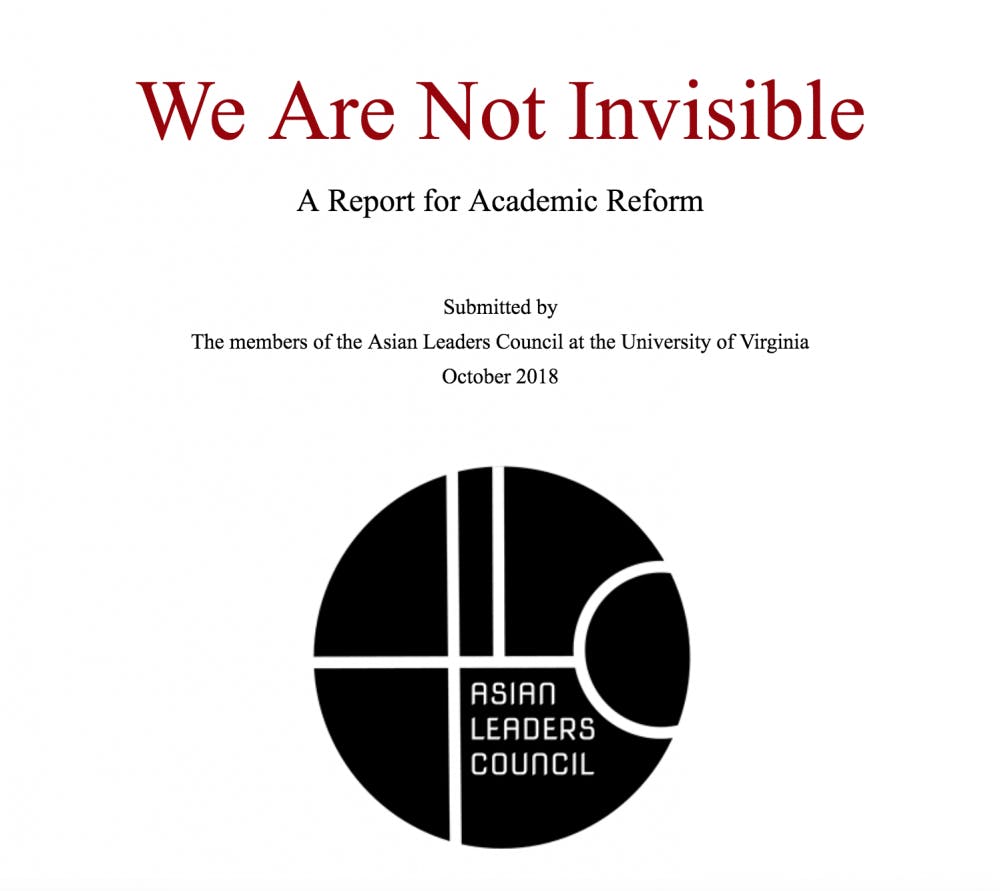The Asian Leaders Council released a report last Thursday on academic reform at U.Va., calling for increased representation of both faculty and the academic programs the University offers focused on Asian/Asian Pacific Americans.
The ALC is an umbrella organization with 14 Asian/Asian Pacific American constituent organizations.
The report — entitled “We Are Not Invisible: A Report for Academic Reform” — is divided into four main sections. The first section details the ALC’s motivations for writing the report, alluding to a recent open letter to the University administration from Hispanic and Latinx students, saying they “echo many of the same frustrations.”
In their open letter and a subsequent document with several policy proposals, Hispanic and Latinx students detailed what they have seen as inaccessibility at the University and a lack of resources to improve their underrepresented presence at the University.
The second section, titled “A Path Forward,” details discrimination faced by Asian-American/Pacific Islander-Americans at U.Va., then argues for creating an American Studies department — currently, American Studies is housed in a program. The third section discusses how the University can incorporate Asian-American student voices into its curriculum, using anecdotes from two students.
The fourth section focuses on institutional support Asian-Americans and Pacific Islander-Americans receive from other higher education institutions around the country, such as Harvard University, the College of William and Mary and George Washington University. According to the report, William and Mary offers at least 14 different courses related to the Asian American identity for its students, including courses such as “Acting Asian American” and “Asian Pacific American History.”
The University has received the report and wants to work with various student leaders, Tom Katsouleas, executive vice president and provost, said in an email to The Cavalier Daily.
“[We hope to] address common interests as we promote inclusion and scholarship in important areas, such as curriculum, admissions, and others,” Katsouleas said.
The report is prefaced with information on the creation of the Asian-American/Pacific Islander-American Studies minor 13 years ago. Since then, the report says, no substantial progress has been made in improving the program.
“After thirteen years, there has been no curricular progress,” the report says. “We have only regressed. This proposal highlights the need for hiring faculty of color, diverse course offerings, and the departmentalization of the American Studies programs. It offers clear solutions to accomplish these goals. It is time for the University of Virginia to act.”
The report says 14 percent of the student population in the College identifies as Asian, but 8.46 percent of the faculty identifies as Asian.
Vilas Annavarapu, a third-year College student and ALC chair, said the Asian-American Studies minor was conceived and established in 2005 through the efforts of faculty members who felt the University did not place enough emphasis on the academic area. However, the Asian Student Union had initially brought up the idea of it to Student Council in 2003.
“This report is intended to make the experiences of Asian-Americans and a lot of other minority groups including Native American students, Latinx students, Muslim students feel as if they have some degree of representation in our curriculum,” Annavarapu said. “Not representation just for the sake of representation, but the understanding that it is critical that academic courses create spaces for thoughtful engagement with questions of identity.”
The Facebook post where the ALC released the report said Asian/Pacific Islander/Desi American — or APIDA — community members must make it clear to U.Va. administration that it is “time for the University to see [them].”
A key demand of the report is increased investment to hiring faculty of color because of the value they add in the classroom and how they shape student experiences, Annavarapu said.
“One of the aspects of the report asks students to describe the experiences, the ways in which faculty of color have shaped their experiences both inside and outside of the classroom,” Annavarapu said. “And it’s just really powerful because it illustrates the amount of positive good that faculty of color provide to minority students.”
One part of the report, titled “On a personal note,” talks about the struggles Annavarapu and Joseph Malasa, a fourth-year College student and president of the Organization of Young Filipino Americans, have faced and how the lack of faculty of color has affected their mental health and their feelings of voicelessness.
“I frequently faced invalidation as other professors often said other classmates lacked similar concerns,” Malasa wrote in the report. “I felt hopeless to the point that what I did not think even studying would make a difference. These fields did not seem to incorporate my identity as a Filipino-American, nor did it feel like they tried.”
Annavarapu also said the Asian-American experience — including their struggles — is ignored and therefore made “invisible,” and that the report is meant to add visibility to these issues and serves as a first step in vocalizing the desires of the greater APIDA community.
The report was written by different members of the ALC and its constituent organizations.
“This is intended to be a very democratic type of report,” Annavarapu said. “In no way is it intended to be closed off to a certain group of people.”
Annavarapu also said that although the University is predominantly white, it doesn’t make the the experiences of minority students “inaccessible.”
“These are issues that impact us all, but they’re also issues minority students particularly care about,” Annavarapu said.







